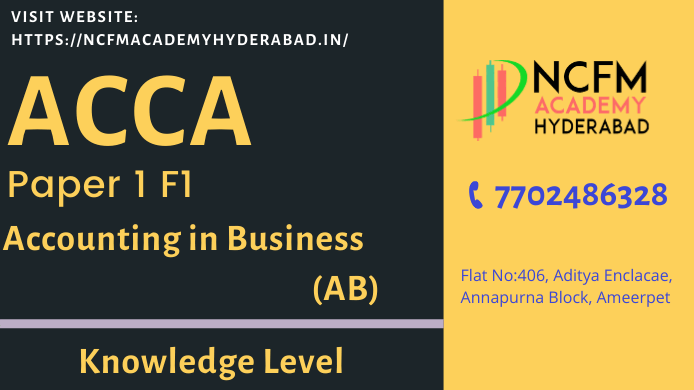Accountant in business (AB) is the first exam you will be required to appear in your journey towards ACCA qualification. This exam introduces students to the business environment. Students who are not from a finance background can in particular benefit from this course ACCA F1 Accountant in Business.NCFM Academy Hyderabad one of the leading financial courses training centers is providing ACCA Training in Hyderabad, its Ameerpet Center.
Accountant in Business is the first exam of the foundation level; this course will teach you how what a business really is. What are the factors which affect a business as a whole, how business is operated and managed efficiently and what are the broader implications of the internal and external environment the business is operating in?
Exam Format of ACCA F1 Accountant in Business
The syllabi of all foundation level exams are assessed by a two-hour-long computer-based examination. The syllabi as a whole are examinable; all of the questions in the exams will be compulsory which means that there is no topic that should be left out by the students during their preparation. The questions are designed in such a way that they test the knowledge, comprehension, and application of the knowledge acquired by the students.
Section A will contain 30 two mark objective questions and 16 one mark objective questions.
Section B will contain 6 four mark multi-task questions each of which will examine one of the six main sections of the syllabus.

ACCA F1 Syllabus
The F1 ACCA syllabus is divided into six sections with further sub-sections.
A- The business organization, its stakeholders and the external environment
This is the first section that serves as an introduction to business and its environment. Students will learn the purpose and different types of business organizations like a sole proprietorship, partnership and different forms of companies. The students will learn who the stakeholders are and how they are connected with the business and the effect of internal and external factors on business. Macro and microeconomic factors will be covered in detail so that a thorough understanding of factors affecting business activity is developed.
B- Business organizational structure, functions and governance
The second section deals with business entities in greater detail. This section aims to impart a thorough understanding of formal and informal business organizations. It further focuses on the introduction and detail of the need for an organizational structure and the benefits thereof. Organizational culture of a business and its implications is one of the areas the students will be introduced to in this section. The role and function of committees will be covered as well as the importance of corporate governance and students will be introduced to the concept of social responsibility of a business organization.
C- Accounting and reporting systems, compliance, control, technology and security
The third section introduces the students to the accounting and reporting systems and their function and importance to the business organizations. Students will learn how the accounting function is linked and interrelated to other functions and departments of a business and how the accounting function forms the backbone of any business organization. An introduction will be given to the principles and concepts of law and the regulations which govern the accounting and auditing functions. Students will learn that accounting is a dynamic profession and there are rules and standards which apply to account and auditing.
An introduction will be given to bookkeeping and the need for financial statements and their end-users, the students will learn about different financial systems, their procedures, and related IT applications. Audit related topics like internal control and its importance to an organization, the need for securing financial and business-related data will be covered.
This section also focuses on making the students understand fraud, its nature and its implications for the organization and the methods for the prevention and detection of fraud and money laundering.
D- Leading and managing individuals and teams
The fourth section of the syllabus deals with leadership, management, and supervision which is basically human resource management. Students will be introduced to the concepts of leadership and its various traits and theories and the difference between a leader and a manager. Students get to learn and understand the process of recruitment and selection of employees and the individual and group behavior in business organizations and the related issues such as conflict management and team formation, development and management.
This section will introduce the concept of motivation for individuals and groups and the related theories and the need for motivation for a business organization. Appraisal techniques will be covered under this section and the need and importance of annual performance appraisal will be one of the key areas under this topic.
E- Personal effectiveness and communication
The fifth section of the syllabus introduces the very important topic of communication to the students. Students will learn personal effectiveness techniques at work and the adverse consequences of ineffectiveness. This section covers competency frameworks and personal development for finance professionals.
The section also covers the sources and reasons for conflicts and the methods and techniques for effective conflict resolution. Communication in business is introduced as a topic and the components and importance of communication in a business environment are one of the topics students will be required to learn and understand.
F- Professional ethics in accounting and business
The sixth and last section of this course deals with fundamental principles that underpin ethical behavior in a business environment. Students will be taught the need for ethical behavior in theory and in practice, the course will cover the role of regulatory and professional bodies in promoting ethical and professional standards in the accountancy profession.
The corporate codes of ethics will be introduced and the students will be required to learn and understand the various situations under which ethical conflicts can arise and the dilemmas which are posed while trying to resolve those ethical conflicts in a professional manner.
